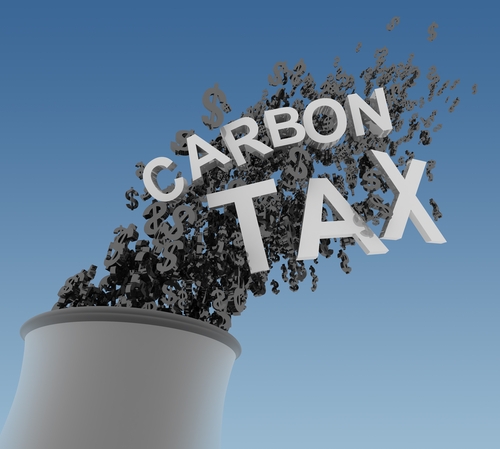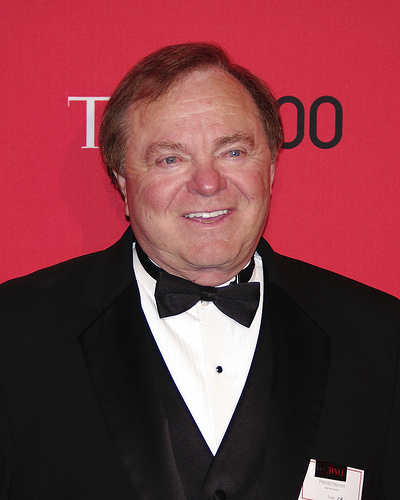
Photo by David Shankbone.
Ladies and gentlemen, meet Harry Hamm, subject of a very warm profie in the Washington Post this weekend. (To be fair, I don’t know that he goes by Harry, but the name “Harry Hamm” is hard to pass up, except at a diner.)
[T]he 66-year-old Hamm is a multibillionaire who could buy [his hometown of Lexington, Okla.] several times over. An early believer in the notion that the techniques of horizontal drilling and hydraulic fracturing could be merged to unlock new layers of oil, he is the chief executive of Continental Resources, the leading exploration company in the booming Bakken Formation, which stretches across Montana, North Dakota and Saskatchewan. His 68 percent stake in the company is currently worth $7.7 billion, and Forbes recently ranked him the world’s 76th-richest person.
Harold Hamm, a figure who detoured from a Horatio Alger novel straight into Dallas. Be warned, humble reader: “His public relations person jokes that once people talk to the upbeat, personable oilman, they’re ‘Hammanized.’ Even many of his political foes say he’s hard not to like.” Seems like that should have been “Hammered,” but, fine. You meet the guy, you like him. Fair enough.
Well, I haven’t met him. And based on this profile, he doesn’t exactly seem like the sort of guy I’d like to hang out with.
First, there’s his politics.
He hosted a fundraiser for Mitt Romney’s presidential campaign and recently donated $985,000 to Restore Our Future, a super PAC devoted to supporting Romney’s candidacy. While super PACs are supposed to be independent, the former cotton picker has also become a member of Romney’s energy advisory team, feeding the candidate optimistic assessments about U.S. oil production. Hamm is trying to take the lessons of the Oklahoma and North Dakota oil patches and apply them in Washington for the nation’s benefit — and his own.
Super PACs are supposed to be run completely separately from candidates’ campaigns. Candidates are bound to fundraising limitations and disclosure guidelines; super PACs are not. If a super PAC knows where a campaign is spending its money and what its plans are, it basically becomes an adjunct to the campaign, investing in the holes the campaign leaves behind. If the two could coordinate, a candidate wouldn’t need to fundraise for an official campaign at all, but could just append a super PAC that takes billions in anonymous donations. The legal separation is meant to protect what paper-thin campaign finance regulations we still have in place. The Post doesn’t mention this. Guess it got Hammanized!
As for Hamm’s goal of turning America at large into a reflection of a North Dakota oil field for his own profit, you can judge that on its own merits.
Next, the Post explores Hamm’s views on oil reserves.
Hamm promotes a vision of oil plenty. “There are two separate camps,” Hamm said. “One of them is that the oil and gas resource is very scarce and running out; that the glass is not half full; that it is drying up. And the other [camp] being one of abundance and what’s really here.”
He said, “The one of scarcity, that’s just wrong. It’s been overtaken basically by the technology that’s gone on with horizontal drilling.”
So those are the two camps. One side, presumably ours, simply says: Oil will run out! His says: We have plenty! Therefore, he wins.
Hm. But what if we present the two sides this way. One says: Continued use of fossil fuels is destroying the planet! The other: Who cares! Granted, it’s a less “upbeat” formulation, but perhaps a valuable point to raise. (It is not raised.)
Then, there are environmental regulations. Despite Continental Resources’ stock price more than tripling since Obama took office, Hamm of course opposes the president and EPA’s efforts to curtail pollution.
“Our air was polluted, and we cleaned it up,” says Hamm. “Our rivers were polluted, and we cleaned them up. What’s going on with fracking? What’s the problem? There’s not a problem. The regulatory aspects should be with the states, with the North Dakota Industrial Commission. … None of us wants to pollute any of our water. If it meant not fracking another well, I wouldn’t do it if it weren’t safe.”
Last July, Continental Resources reached a settlement with the government for improperly dumping volatile organic compounds into the air [PDF]. Last September, the company was fined for dumping 200 gallons of oil in Kentucky [PDF]. That’s after about five minutes spent searching for violations.
To be fair, the Post does note that Hamm’s rhetoric often doesn’t sync with reality.
Many of the things Hamm says in casual conversation might not stand up to greater scrutiny. He once said that the Dickinson, N.D., McDonald’s was the second-busiest in the world, which isn’t the case. More important, he says that the U.S. government could make $12 trillion in royalties from oil and gas drilling on federal lands and waters. Assuming the current 13 percent royalty rate, production on federal lands and waters would have to exceed current worldwide oil production for the next 25 years.
But overall, I suspect that this profile will make its way into regular rotation by the Continental Resources media relations department. And I suspect that the Post’s readers will have a newfound respect for a man who worked his way up from nothing to build an empire deeply committed to wringing every red cent out of the last days of the environment as we’ve known it.



